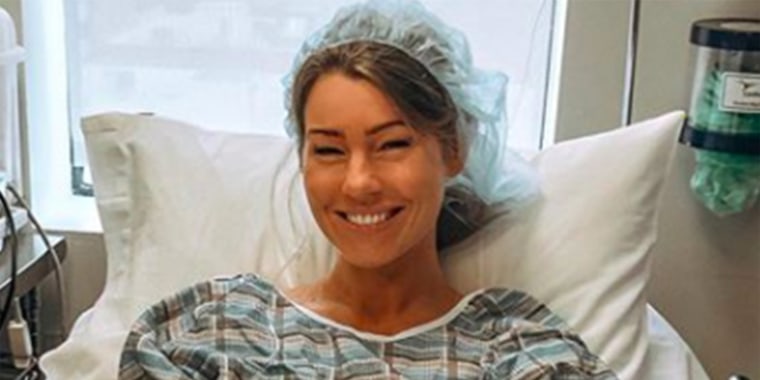Ann Victoria thought getting pregnant would be easy. The 31-year-old fitness influencer and founder of the FitBody app came from a big family, and her mother never had issues conceiving. Yet after nearly two years of trying to conceive, she decided that she would try in vitro fertilization (IVF). This is her story, and here are the things she wants women to know about the process.
1. The process leading up to fertility treatment can be just as challenging as the IVF process itself.
My husband, Luca, and I tried to conceive naturally for about a year. At that point, my OB-GYN suggested I talk with a fertility specialist.
They did blood work and checked my hormone levels. They also did an ultrasound. Everything looked normal, but I wasn't getting pregnant. Luca and I decided to start fertility treatments with a medicated intrauterine insemination (IUI). An IUI is when healthy sperm is placed in the uterus as close to the time of ovulation as possible. It is an outpatient procedure that seemed like a logical first step for us.
That didn't work. Then we did our second IUI right away. That one didn't work either. And after that is when the doctors started saying, “OK, we don't know why you're not conceiving.” Then we did an HSG (hysterosalpingogram), and that is where they shoot a type of black dye through your fallopian tubes to see if you have any blockages and to see if the inside of the uterus looks normal. The doctors said everything looked fine.
We decided to take a break for the next several months. The whole process is really stressful, mentally and emotionally, and my hormone medication during that time certainly wasn't making it any easier. My husband was the one who convinced me to take a break, and it ended up being really nice.
By then, we had decided that if we hadn't conceived in a few months, we would start IVF, and that’s what ended up happening.
2. One part of the IVF process can be more physically painful than the others.
After you go through the first steps of IVF, where you give yourself hormone injections to encourage the body to produce multiple eggs. The second step, and most important part, is when you have your egg retrieval, an outpatient surgery where a doctor retrieves the mature eggs.
The doctors told me that the threshold for when the procedure becomes really painful is after about 10 to 15 eggs are retrieved. I had 25 eggs removed. It took me about five days to even walk without pain or holding onto something. It was by far the worst part of the process for me, but every woman’s experience is different depending on the number of eggs she has retrieved.
But, everything else from there was smooth sailing for me.
3. Every woman’s timeline will look different.
I would recommend not getting too stuck on a specific timeline. When and if you do decide to do IVF, you have to know that your timeline is going to get thrown around all over the place.
Many people will aim to start IVF one month so that they’ll have their baby in a certain month down the line, but it most likely won’t work out that way.
We probably had about four different cycle interruptions throughout the whole process, and each time was so frustrating, but there’s nothing you can do, so you have to be flexible and not put your life on hold because of it.
4. Being open about IVF helped me cope.
Being open to my social media followers was a huge part of the coping process for me.
Before I started IVF, my reproductive endocrinologist was trying to figure out what was causing my infertility. One of the things they suggested was to ease up on exercising and raise my calories a bit, which caused me to gain some weight. I wasn’t stressed because of the weight I had gained, I was stressed because people didn’t know why I had gained it. I wanted to share with my followers that it’s OK to gain weight, especially during times like what I was going through.
Within the first 24 hours of me initially sharing my story online, I got thousands of messages from women who had gone through the same thing or knew someone who went through the same thing. It was really therapeutic and amazing to know that I wasn’t alone.
I found some TTC (trying to conceive) and IVF Facebook groups, which was a huge help in reading stories about and connecting with women who were going through similar struggles.
5. It made my relationship with my husband stronger.
This journey can definitely make or break couples. I’m not going to say things were hunky-dory from day one — there were moments where we would get in fights and I would say things out of hormonal rage. My husband, Luca, had to deal with the blowback.
It wasn’t always easy, but we overcame any fight we would get into. We were very good at communicating with each other and making our intentions clear. If anything, it's shown us that if we can get through that, we can get through anything.
As tough as our TTC journey was, I wouldn't change a thing. Every injection, tear and moment was worth it because it brought us to where we are today, pregnant with our first child. This is the child we were meant to bring into the world and I'm grateful for the life lessons and patience we learned along the way to get to where we are today.




